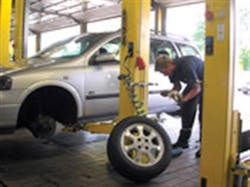Winter tires “are much bigger in Germany than in the U.S. because (vehicle owners) change their tires twice a year,” says Andreas Gerstenberger, executive vice president of sales and marketing for Continental Tire North America Inc.
It’s not compulsory to switch from summer to winter tires in Germany between October and March (except in some mountainous areas). However, the legal system takes a dim view of driving on summer tires in the winter.
Tire dealers in Germany promote winter tire sales accordingly. In May, I visited a Vergolst Reifen + Autoservice outlet in the town of Gladbeck. At that time, drivers still were switching back to their summer tires.
They also were offered a choice of four winter tire care packages. They ranged in price from 18.50 euros ($28.72 per tire) to 14.50 euros ($22.51 per tire).
Store Manager Andreas Freese says coverage includes storing the tires during summer and winter, wheel balancing and tire and wheel cleaning. The “exclusive” package includes filling the tires with nitrogen.
He estimates close to 60% of his customers change back and forth. Another 30% don’t change at all — “They drive 5,000 kilometers (3,100 miles) or less.” The remaining 10% drive on all-season tires.
Continental runs 237 Vergolst Reifen + Autoservice dealerships in Germany. They offer Continental, Barum (exclusive to Discount Tire Co. Inc. in the states), Semperit, Uniroyal and Sportiva. The Gladbeck outlet also sells Vredestein, Michelin and Goodyear brand winter tires. Freese says Continental corporate brands account for 85% of inventory.
“A consumer wouldn’t go here if it was a mono-brand (store),” says Gerstenberger. “They sell what they need to.”
[PAGEBREAK]
Unwritten law: Weather conditions matter
The legal system takes a very common sense approach to winter tire usage in Germany between October and March.
Although drivers are not required to switch from summer to winter tires during that time, they may be penalized if their tires are a) not appropriate for the weather and road conditions, or b) if the vehicle is involved in an accident.
Fault in an accident may hinge on whether winter tires would have made a difference. In addition, the driver’s insurance may be voided.
So the owner of a BMW Z4 Coupe with summer tires can go for a quick drive on the Autobahn in the middle of December if the temperature permits. He just has to be careful.




